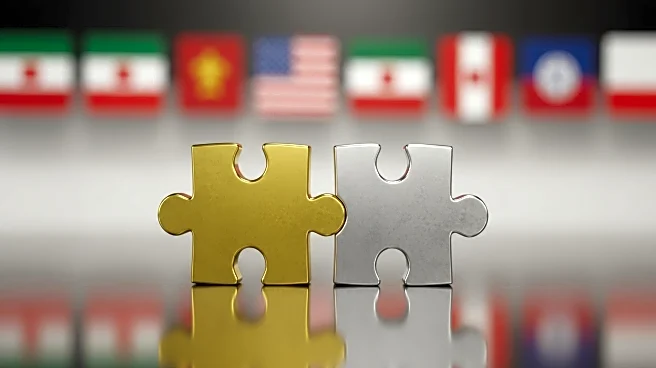What's Happening?
Russian President Vladimir Putin has praised the Trump administration for its 'energetic' efforts to end the war in Ukraine. During a summit in Alaska, Putin hinted at the possibility of a nuclear arms control deal between Moscow and Washington. The summit aims to create long-term peace conditions between the two countries and globally. Putin's comments come after President Trump announced the summit, which will focus on strategic offensive weapons control. The New START treaty, which limits nuclear arsenals, is set to expire in February 2026, adding urgency to these discussions. President Trump has also strategically positioned nuclear submarines near Russia in response to provocative remarks by Dmitry Medvedev, Russia's former president.
Why It's Important?
The potential for a nuclear arms control deal between the U.S. and Russia could significantly impact global security and stability. Such agreements are crucial in preventing nuclear proliferation and reducing the risk of nuclear conflict. The summit's focus on Ukraine peace talks also holds importance for European security and the geopolitical landscape. Successful negotiations could lead to a reduction in hostilities and pave the way for further diplomatic engagements. However, the exclusion of Ukraine and European leaders from the summit raises concerns about potential concessions that may not align with their interests.
What's Next?
The summit will include a one-on-one conversation between President Trump and President Putin, followed by a business lunch and a joint press conference. Discussions will cover the war in Ukraine and potential cooperation in trade and economic issues. President Trump has indicated the possibility of a second meeting with Ukrainian President Volodymyr Zelensky, potentially involving European leaders. The outcome of the summit could influence future diplomatic strategies and the involvement of other stakeholders in peace negotiations.
Beyond the Headlines
The summit's exclusion of Ukraine and European leaders highlights the complex dynamics of international diplomacy, where major powers often negotiate terms that affect smaller nations. The ethical implications of such negotiations could lead to shifts in alliances and influence global power structures. Additionally, the focus on nuclear arms control underscores the ongoing challenge of balancing national security with global peace efforts.









